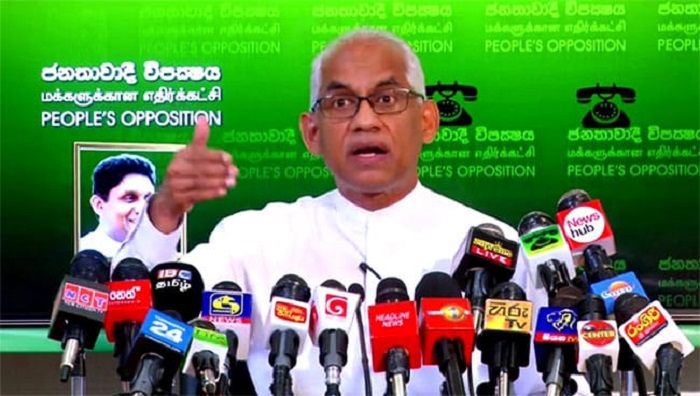
SJB Parliamentarian addressing the media in Colombo today said that the public and the private sector workforce who are contributors to the EPF and ETF Funds are badly affected by the government’s Domestic Debt Restructuring programme, whilst the affluent and the cronies are allowed to get windfall gains within a short period.
Government debt that needs to be restructured was around Rs. 12.8 Trillion, of which around Rs. 4 Trillion was Treasury Bills and the remaining Rs. 8.7 Trillion was Treasury Bonds. Government’s immediate solution was to extend the maturity of CBSL bills transforming them in to long term Bonds. Government used the word Debt Optimizing to mislead people when it comes to treasury bonds.
Of the Rs. 8.7 Trillion Treasury Bonds, the government was selective. 36.5 % of Treasury Bonds to be restructured belongs to the EPF fund – a big blow to the EPF fund and its members.
IMF has directed the government to bring down its foreign debt servicing to 4.5 % and the government endeavoured to get bilateral and multilateral support to restructure the foreign debt of the country. The total debt stock of the country is now 128% of the GDP, where as it should be around 60% for a middle-income country and IMF had suggested to bring down the debt to at least 95% of GDP as a medium-term solution.
Central Bank states that Sri Lanka owes US$ 7.1 billion to bilateral creditors, of which US$ 3 billion is owed to China, US$ 2.4 billion to the Paris Club and US$ 1.6 billion to India – the government is yet to reach a final agreement with its bilateral and multilateral partners on its Debt Restructuring.
In the meantime, the Gross Financing Need is still very high at 34% and need to be brought down to 13% between 2027 and 2032. Gross financing needs are fiscal deficit, debt amortization and non-debt financing needs to be financed through sources including government securities as well as domestic and foreign loans. Sri Lanka is trying to reduce its overall debt by $17 billion in the medium term through restructuring.
The government had earlier announced that it will opt for foreign debt restructuring, instead of a Domestic Debt Restructuring. It appears that the government does not have international confidence to pursue this outline and has now turned its gun towards domestic debt restructuring.
The DDR affects the EPF and ETF beneficiaries, but bank owners, corporate investors and affluent individuals have a windfall gain on treasury bonds. The SJB opposed the government’s DDR as it burdens the EPF fund and heavily affects 90% of its members whose only saving in life is the said fund.
Mr. Wickramaratne questions as to why the government confined the restructuring programme to the EPF and ETF alone, when it took the decision to restructure Treasury Bonds. In the recent past, the yield rate went up to 28-30% on Treasury Bonds and the private investors are not affected by the DDR as restructuring has no effect on private Treasury bonds. Even the bank owners are benefitted as the banks are exempted from the DDR. (SJB)
